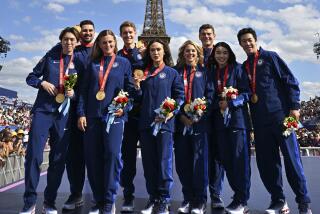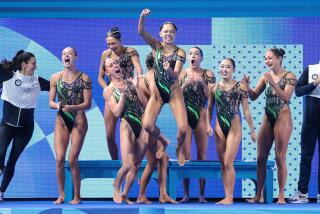On Two Tracks, Americans Mine Historic Gold
- Share via
PARK CITY, Utah — There were Jean Racine and Gea Johnson, a soap opera in a sled.
And there were Sandra Prokoff and Susi-Lisa Erdmann, the seemingly unbeatable German pilots.
Whoever dreamed that Jill Bakken, an afterthought in the tumultuous buildup to the inaugural women’s Olympic bobsled competition, and Vonetta Flowers, a track star who had planned to retire from sports after failing to make the U.S. 2000 Summer Games team, would steal the spotlight Tuesday, not to mention the first gold medal in the event?
But Bakken, known as a gifted driver who faltered in major events, and brakeman Flowers came up big on the biggest day in their sporting lives.
It topped off a day that was almost a fantasy on ice for the U.S. women. Michelle Kwan finished the figure skating short program in first place. Sasha Cohen and Sarah Hughes were in third and fourth place, respectively, heading into Thursday’s final. And, in hockey, the U.S. women’s team took the final step to the seemingly inevitable: Their 4-0 win over Sweden put them in the final against Canada on Thursday.
Bakken and Flowers did their part, posting the fastest runs in each of the two heats at Utah Olympic Park for a total time of 1 minute 37.76 seconds, a comfortable .30 of a second ahead of Prokoff and Ulrike Holzner.
World Cup champion Erdmann and Nicole Herschmann finished third in 1:38.29; Racine and Johnson were fifth in 1:38.73.
The Bakken-Flowers victory had historic overtones. Flowers became the first African American to win a Winter Games gold medal. And this was the first U.S. bobsled medal since an American four-man team won a bronze medal in 1956.
The two were the last sled to race in the second heat, and when their winning time flashed on the scoreboard, it set off a wild celebration among the athletes, their coaches and fans.
Bakken, 25, a Park City resident, hugged her mother, Peggy Smith, a single mom who once took out a second mortgage on her house to help finance her daughter’s bobsled career.
Flowers was in tears an hour later at a news conference.
“I have truly been blessed to come into this sport and pick it up so fast,” said Flowers, 28, of Helena, Ala., who got into bobsledding in 2000 when she saw an ad posted at a track meet by a driver looking for a brakeman. “My goal was the Summer Olympics. God had a different plan, and I’m grateful to be here now.”
It once seemed doubtful either athlete would ascend to the top step of the medal podium. Bakken has battled injuries throughout her career and finished ninth on the World Cup circuit in 2000-01 and sixth this season.
By December, she questioned whether she and brakeman and good friend Shauna Rohbock could generate the kind of starts crucial to winning an Olympic medal, so she wound up teaming up with Flowers, who had been out of the sport since October after splitting with another driver.
About the same time, Racine, the 2000-01 World Cup champ, dropped best friend Jen Davidson as her brakeman after the two slipped behind Prokoff and Erdmann in this season’s World Cup races. Racine added former NCAA heptathlon champion Johnson, who was suspended in 1994 from track and field for the use of anabolic steroids.
While Bakken escaped criticism for her brakeman switch, Racine attracted a torrent of criticism. Much of the difference in reaction came from the fact she and Davidson were objects of a major marketing campaign that emphasized their friendship.
Racine and Johnson were a medal favorite, but Johnson injured her left hamstring Saturday, and the effect was obvious in their poor starts Tuesday. Even at full strength, though, Johnson and Racine might not have caught Bakken and Flowers, who set a track record of 48.81 on their first run.
While Racine and Johnson fielded endless questions about their respective controversies, Bakken and Flowers were happy to escape attention until Tuesday.
“A lot of people saw us as the other team, and we had to come out and prove them wrong,” Flowers said.
She had nothing to prove in making African American sports history: She didn’t realize it was there to be made until she was asked about it.
“Hopefully this will encourage other African American girls and boys to give winter sports a try, because you don’t see too many of them out there,” she said.
More to Read
Go beyond the scoreboard
Get the latest on L.A.'s teams in the daily Sports Report newsletter.
You may occasionally receive promotional content from the Los Angeles Times.






